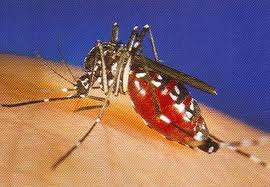 |
| Damned bugs! |
As The Mercury reported Sunday, this is a banner year for mosquitoes and it has yielded a bumper crop of those testing positive for the West Nile Virus.
If everything went according to plan Monday, the Montgomery County Health Department sprayed in Pottstown's Riverfront Park and at the wastewater treatment plants in both Pottstown and Limerick.
Mosquito samples taken at those locations were found to be carrying the West Nile Virus.
Now came the news yesterday that the Pennsylvania Department of Environmental Protection will be spraying for mosquitoes in Wyomissing, Mohnton and West Reading boroughs and portions of Reading, Berks County.
According to DEP, Mosquito samples in 41 counties have been identified with the West Nile virus so far this year, although no human cases have been confirmed.
 |
| Have you seen this virus? Call the health department immediately |
The average date of first detection over the last decade is June 17.
A mild winter followed by an early, wet spring is the likely culprit, say experts.
Native to Africa, West Nile Virus has been present in the United States since 1999 when it was first detected in New York City. Transmitted by a particular family of mosquito, it has gradually spread to most of North America.
The virus causes a mild illness in most people. Symptoms include fever, headache, body aches, swollen glands and a skin rash. In some cases, about 1 in 50, it causes an inflammation of the brain called West Nile encephalitis, which can be serious, producing severe headaches, convulsions and even coma.
Last year, Pennsylvania confirmed seven human cases of West Nile infection, a far cry from the 236 cases detected in 2003 when the virus was a relatively new phenomenon. West Nile killed 43 people in the U.S. in 2011. While Pennsylvania reported five serious cases, none was fatal, according to the Centers for Disease Control.
There is some evidence that declining human infection rates are caused at least partly by less frequent testing for the virus by health care providers, said William Reisen, an expert on the disease at the University of California, Davis. There's also less federal funding available for surveillance.
"The requests of physicians for testing can in some ways drive the appearance of whether things are increasing or decreasing," Reisen said.
 |
| Hopefully, the cure for disease-laden mosquitoes won't be worse than the disease. |
Warmer temperatures typically lead to faster spread of the virus, Reisen said.
Did you see that? Warmer temperatures? One more thing brought to us all by global warming.
(I shared my thoughts on THAT subject in Sunday's post.)
Anyway, since I don't want any of my readers (both of you) to suffer headaches, fevers, sores, convulsions or comas, the research staff here at The Digital Notebook has put together this handy checklist of things you can do to fend off this threat.
(If it looks somewhat similar, or even identical, to a list from the Montgomery County Health Department offered in a recent Mercury story, I assure you that it is entirely coincidental.)
 |
| Don't help mosquitoes by leaving standing water un-emptied |
- Identify and eliminate all sources of standing water that collect on your property. Mosquitoes will breed in any puddle that lasts for more than four days.
- Dispose of tin cans, plastic containers, ceramic pots, or similar water holding containers that have collected on your property. Do not overlook containers that have become overgrown by aquatic vegetation.
- Pay special attention to discarded tires that may have collected water on your property. They can serve as a breeding ground for mosquitoes.
- Drill holes in the bottom of recycling containers that are left out of doors. Drainage holes that are located on the container sides collect enough water for mosquitoes to breed in.
- Have clogged roof gutters cleaned on an annual basis, particularly if the leaves from surrounding trees have a tendency to block drains.
- Turn over plastic wading pools when not in use. A wading pool becomes a place for mosquitoes to breed if it is not used on a regular basis.
- Turn over wheelbarrows and do not allow water to stagnate in birdbaths.
- Aerate ornamental pools or stock them with fish. Water gardens are fashionable but become major mosquito breeding grounds if they are allowed to stagnate.
- Keep swimming pools clean and chlorinated. A swimming pool that is left untended becomes a source of mosquito breeding. Be aware that mosquitoes may even breed in the water that collects on swimming pool covers.
UGH! Those pesky rascals!!! Thanks for the info
ReplyDelete